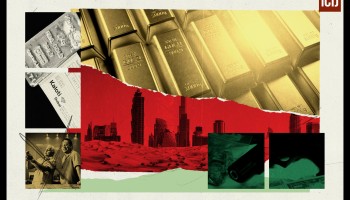Former Thai army Lieutenant General Manas Kongpan and a number of senior police officers are among the defendants, the Asian Correspondent said.
Last year, a scandal ensued when more than 8,000 migrants were stranded in the Malacca Strait. They were turned away by Indonesia, Malaysia, Thailand, Burma and Bangladesh, said the Telegraph and many ended up being lost when traffickers tried to hide their crimes. Many passengers were from the persecuted Rohingya Muslim minority from Burma/Myanmar.
Evidence includes testimonies from Rohingya and Bangladeshi trafficking survivors and investigators, as well as unidentified bodies exhumed from mass graves.
Thai prosecutors charged the defendants with human trafficking involving international crimes, illegally holding others and concealing bodies, reported Radio Free Asia. If convicted, the human trafficking charges alone carry a sentence of up to 15 years and a fine of up to 1 million baht (US$ 28,469).
"The court is accelerating the case to finish within a year," Prayut Porsuttayaruk, deputy director-general of the Attorney-General’s human-trafficking office, told the Bangkok Post.
The crisis was allegedly kicked off by a regional crackdown on people smugglers, according to earlier reports by the BBC. The traffickers panicked and abandoned boatloads of migrants on the Andaman Sea. Brokers and agents went into hiding.
The crackdowns followed the discovery of mass graves and makeshift detention camps found in the jungles along the Thai-Malaysian border in May last year, reported the BBC and the Telegraph.
Gangs of human traffickers allegedly held migrants for ransom in the camps in Thailand or sold them for slave labour to crime syndicates. Some buyers controlled Thailand’s seafood industry making for lucrative profit for the traffickers, the Guardian detailed in an investigation last summer. Many died from disease, beatings or killings if their families could not afford the US$ 2,000 ransom, added the Telegraph.
Earlier this year, activists from the human rights group Fortify Rights expressed their concerns over inadequate protection for key witnesses in the case. Some key witnesses have been forced into hiding and, of the around 500 scheduled to testify, only 12 are being given formal protection by the Ministry of Justice, reported Asian Correspondent.
Deputy-Director General Porsuttayaruk has refuted Fortify Rights' numbers, Reuters reported.
"I don't know where they got their numbers from. Eighty of the witnesses are victims, and they are foreigners, and they are under the protection of the Ministry of Social Development and Human Security," Porsuttayaruk told Reuters
He said that more than 200 witnesses are police officers, and the rest are investigators, bank office workers and "Thai people who do not need the protection program."
The executive director of Fortify Rights, Amy Smith, emphasized the fact that a key witness, the head of the investigation into the transnational ring ex-Police Major General Paween Pongsirin, fled to Australia in December, saying he feared for his safety after Thai authorities ordered a stop to the probe, reported Radio Free Asia.
“We’ve talked to other witnesses who are also afraid—and for good reason. Witnesses in this case are testifying against members of the Thai Army, Navy, Police, the Internal Security Operation Command and others,” she added.
Thailand is ranked on the lowest tier of the United States Department of State 2015 Trafficking in Persons (TIP) report for not taking effective measures against human trafficking. The Thai government has suggested the crackdown and trial prove it is serious about tackling human trafficking, reported the Telegraph.






